September 7, 2025

The article underscores the crucial elements that underpin effective behavior technician training, which is vital for equipping professionals in Applied Behavior Analysis (ABA). It asserts that comprehensive training encompasses essential components such as:
These elements not only enhance practitioners' skills but also significantly improve client outcomes in ABA therapy. How prepared are your technicians to meet the demands of this growing field? By prioritizing these training components, you can ensure that your team is not only competent but also capable of delivering exceptional results.
The landscape of Applied Behavior Analysis (ABA) is rapidly evolving, driven by an increasing demand for skilled behavior technicians. As organizations strive to deliver high-quality care, understanding the key elements of effective behavior technician training becomes crucial. This article delves into the essential components that not only enhance the competency of practitioners but also ensure better outcomes for clients.
With so many training options available, how can one discern which elements truly make a difference in preparing technicians for the challenges they will face in the field? Reflecting on these questions is vital for healthcare employers seeking to improve their hiring processes and outcomes.
In today's competitive job market, the demand for Board Certified Behavior Analysts (BCBAs) is at an all-time high. Hire ABA is a specialized recruitment platform designed to connect BCBAs and support staff with premier job opportunities in the field of Applied Behavior Analysis (ABA). By addressing the unique needs of the ABA sector, Hire ABA streamlines the hiring process, enabling qualified professionals to secure positions that align seamlessly with their skills and career aspirations.
Our personalized resume assessments provide a comprehensive evaluation of candidates' experiences and goals, employing advanced job fit scoring to pinpoint the most suitable opportunities. This targeted approach not only elevates the job-seeking experience but also empowers employers to effectively identify and recruit the right candidates, thereby in ABA therapy settings.
Consider this: how often do you find it challenging to match talent with organizational needs? Hire ABA bridges this gap, fostering improved outcomes for both clients and practitioners. The platform's unwavering commitment to effective job matching is reinforced by insights from industry leaders, highlighting the significance of a supportive recruitment process that benefits both job seekers and healthcare employers.
Take action today and discover how Hire ABA can transform your recruitment experience, ensuring that you find the best candidates to meet your organizational needs.
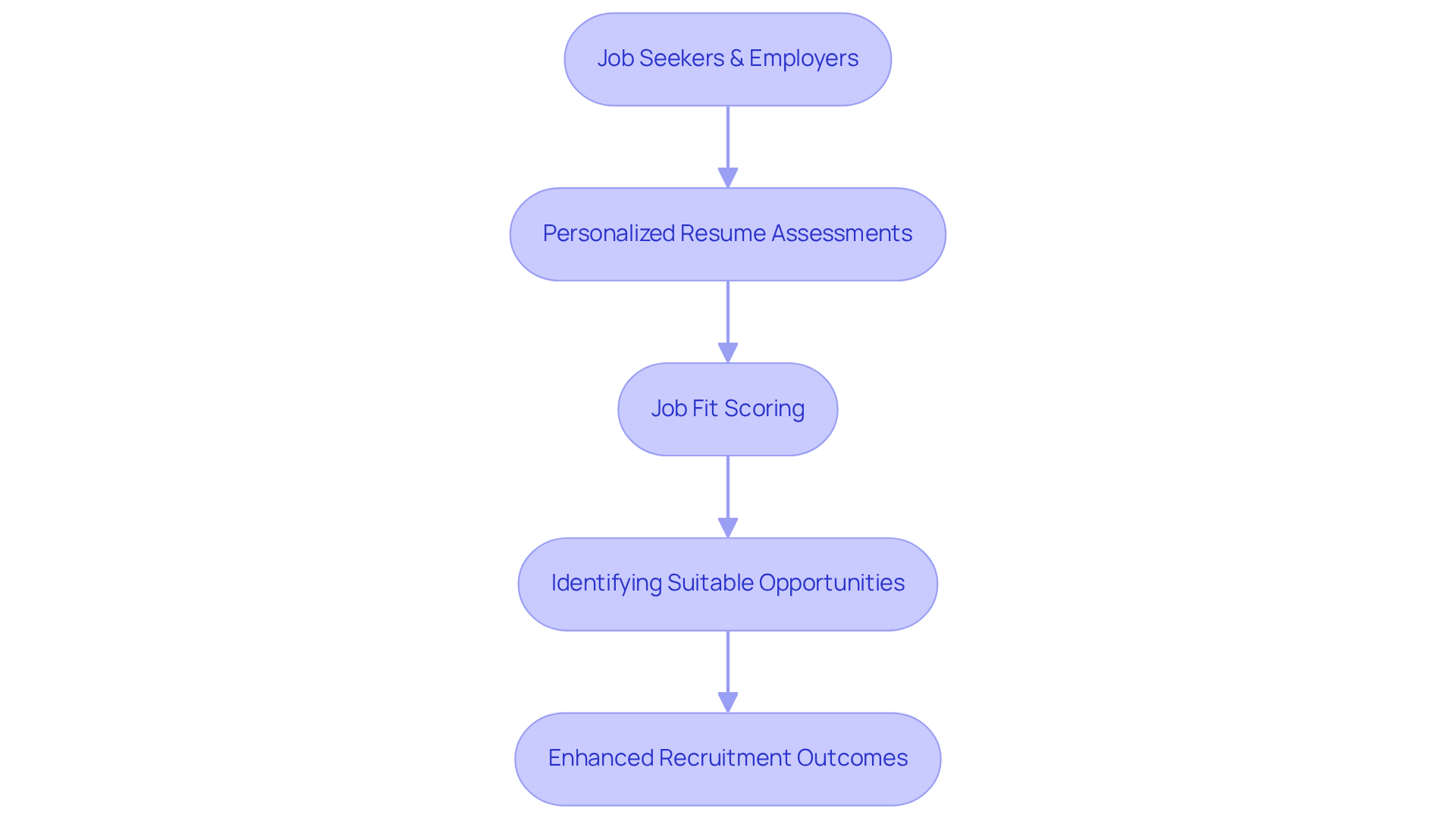
The demand for skilled practitioners in Applied Behavior Analysis (ABA) is on the rise, making behavior technician training, particularly the 40-hour Registered Behavior Practitioner (RBT) course, an essential educational program for aspiring professionals. This foundational course covers critical subjects, including:
Not only does it prepare candidates for the RBT certification exam, but it also enhances their ability to deliver effective ABA therapy.
Recent statistics reveal that candidates who complete this course significantly increase their chances of passing the RBT exam, with first-time pass rates typically ranging from 70% to 80%, and a median pass rate of 80.4% for RBT programs. Moreover, the quality of instruction in behavior technician training plays a pivotal role in the performance of support staff. Those who engage in organized study schedules and utilize diverse learning resources tend to achieve higher success rates. Remarkably, blended learning modalities that combine online training with face-to-face instruction yield the highest pass rates, reaching an impressive 96.7%.
Key topics within the 40-hour course include the RBT Task List, which outlines essential skills, as well as strategies for effective data collection and analysis. As the need for proficient practitioners continues to grow, this course serves as a vital stepping stone for individuals aiming to advance their careers through behavior technician training in the expanding field of Applied Behavior Analysis. Are you ready to take the next step in your professional journey? Consider enrolling in this transformative program today.
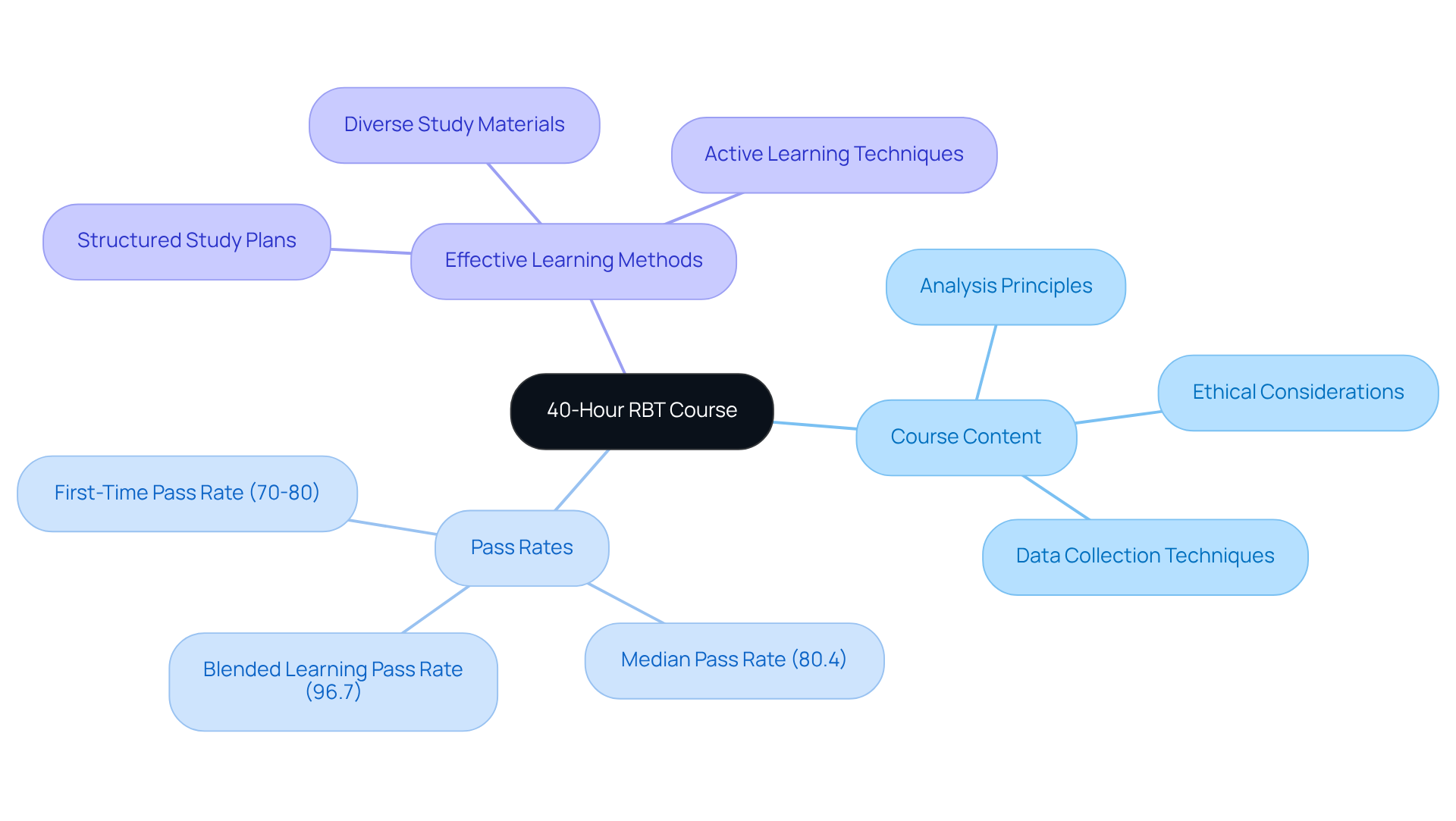
Ongoing professional growth is essential for practitioners to remain current with the latest research, methods, and ethical guidelines in Applied Behavior Analysis (ABA). Participation in workshops, webinars, and conferences not only enhances their skills but also ensures the delivery of the highest quality of care to clients.
As emphasized by leaders in the field, including Dr. Temple Grandin, "Different, not less," this underscores the necessity of adapting to advancements in therapeutic practices. This commitment to lifelong learning significantly elevates the overall service quality in ABA therapy settings.
Engaging in ongoing education empowers specialists to refine their skills and develop effective, personalized treatment strategies tailored to the unique needs of each individual. To effectively engage in ongoing education, professionals should actively seek that align with their developmental objectives.
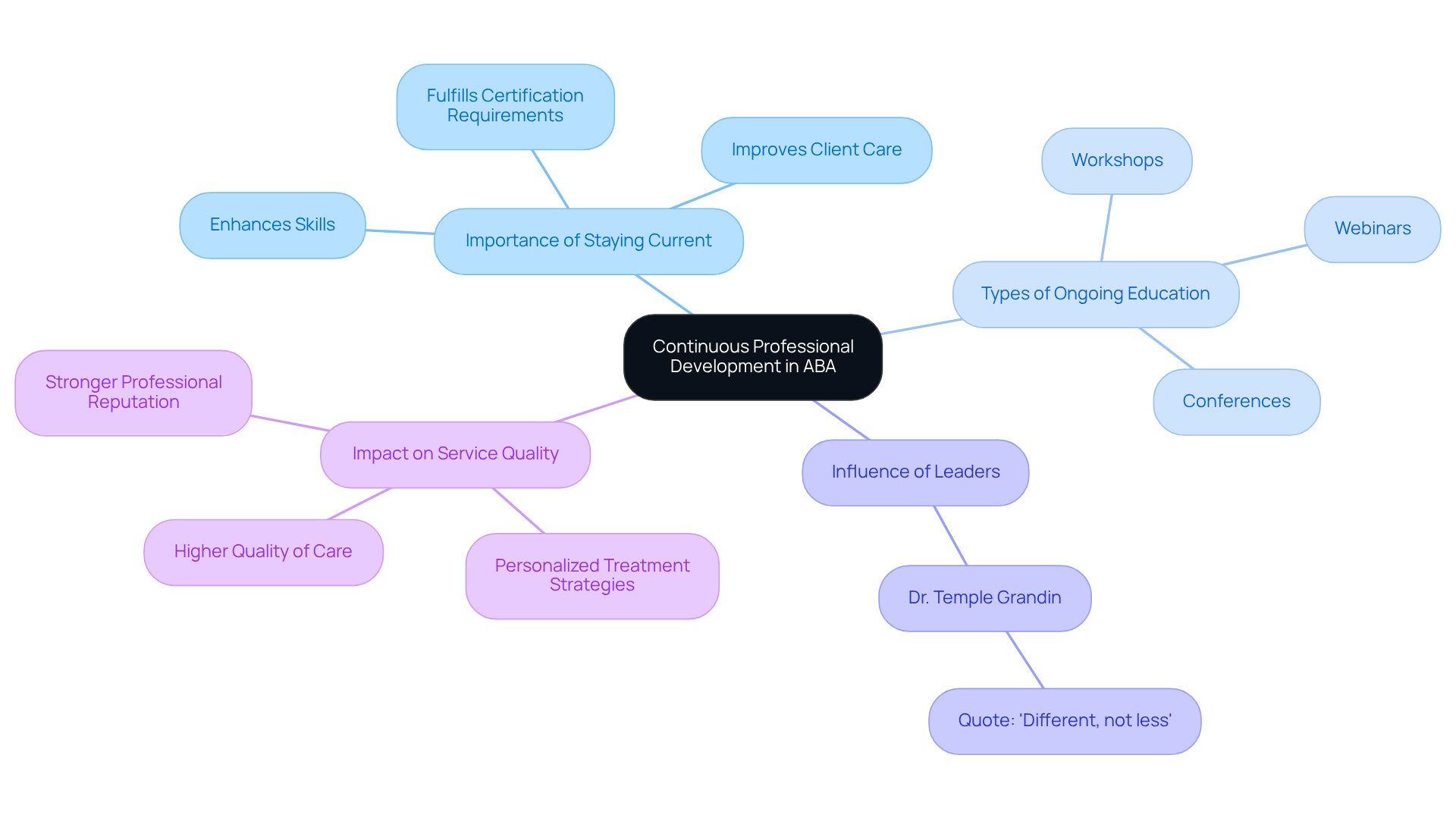
Mentorship and oversight are vital in shaping the education of behavior practitioners, significantly influencing their growth and effectiveness in behavior technician training for Applied Behavior Analysis (ABA) therapy. Experienced professionals offer invaluable guidance, support, and constructive feedback, empowering new technicians to navigate the complexities of their roles. This mentorship cultivates a culture of and accountability, essential for skill acquisition and professional development.
Regular supervision sessions play a crucial role in assessing progress and pinpointing areas for improvement. Research shows that structured supervision can enhance educational outcomes, with participants demonstrating marked improvements in skill execution. For example, studies reveal that effective supervision results in a 90% accuracy rate in executing targeted skills post-training, compared to an average of 36% prior to supervision. This underscores the critical role of supervision in the training process.
Moreover, the benefits of supervision extend beyond skill enhancement; they also contribute to job satisfaction and retention among new professionals. By fostering a supportive environment, supervisors encourage workers to engage actively in their learning journey, ultimately leading to improved client outcomes. As Ralph Moller states, "Continuous professional development is vital for RBTs to enhance their skills and stay updated on best practices within the field." This emphasizes the importance of ongoing mentorship in cultivating skilled and confident practitioners. Additionally, with the job market for RBTs expected to grow by approximately 9% from 2021 to 2031, effective preparation and oversight are more crucial than ever in equipping professionals for this expanding field.

Ethical instruction serves as a vital foundation in the education of practitioners, equipping them to uphold the highest standards of professional conduct. This behavior technician training covers critical topics such as:
All of which are guided by the established Ethics Code of the Behavior Analyst Certification Board (BACB). By fostering a robust ethical foundation, practitioners enhance their ability to make decisions that prioritize the well-being of those they serve while aligning with the fundamental principles of analysis. This unwavering commitment to not only fortifies the integrity of the field but also prepares practitioners to navigate complex situations with professionalism and respect for client rights. Furthermore, ethical education significantly influences decision-making processes, empowering practitioners to effectively implement ethical considerations in their daily practice.
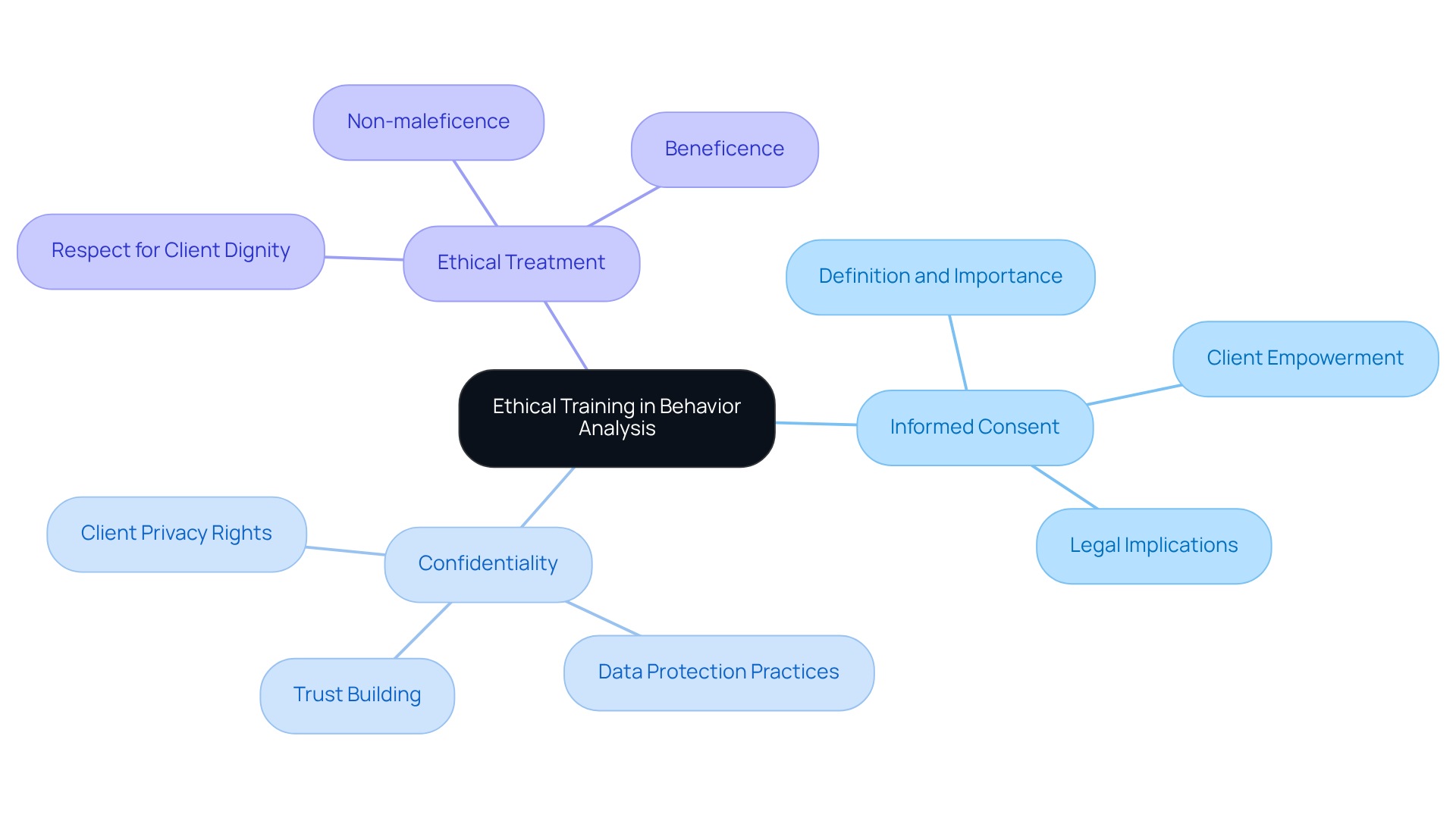
Field practice is a cornerstone of behavior technician training, providing trainees with invaluable hands-on experience in real-world ABA environments. This practical instruction is part of behavior technician training, enabling technicians to apply theoretical knowledge, refine their skills, and master effective customer interaction techniques. Under the mentorship of seasoned professionals, trainees in behavior technician training receive immediate feedback, which is crucial for their growth and confidence in delivering ABA therapy.
The certification procedure for Registered Behavior Technicians (RBTs) involves an average of 40 hours of practical instruction as part of the behavior technician training approved by the Behavior Analyst Certification Board (BACB). This essential element significantly enhances their preparedness to assist individuals facing challenging behaviors. BCBAs emphasize that behavior technician training provides practical experience that not only solidifies learning but also cultivates a deeper understanding of behavioral interventions, ultimately leading to improved outcomes for clients.
Understanding is vital for RBTs to boost learner engagement and motivation. This structured approach to behavior technician training ensures that practitioners are well-equipped to implement effective strategies in their practice.
Moreover, with an anticipated job growth rate of 12% to 17% for RBTs, the demand for skilled professionals in the field highlights the importance of behavior technician training and practical experience. Are you facing challenges in hiring qualified RBTs? Consider the impact that robust behavior technician training and certification can have on the success of your practice.
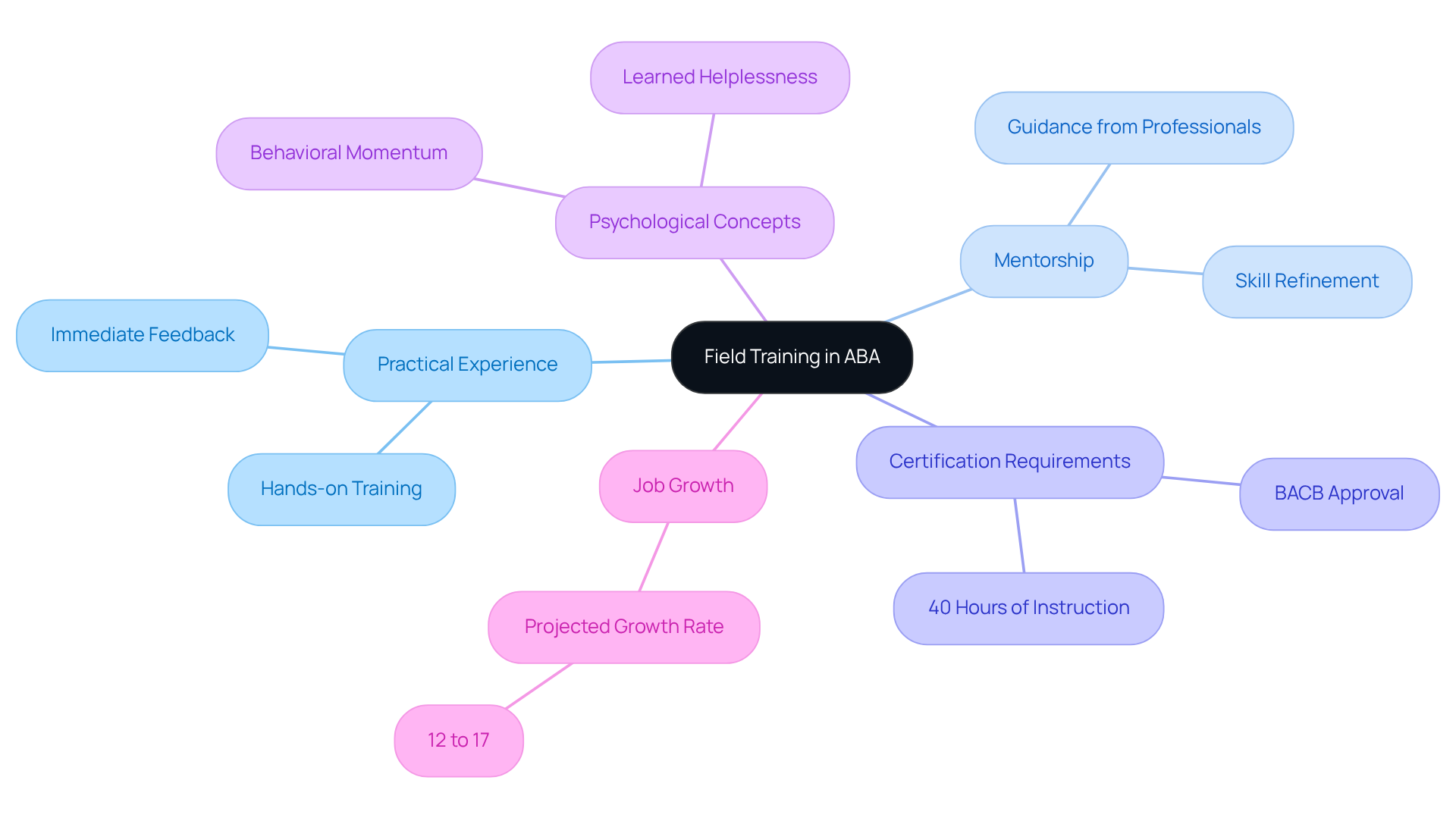
Being prepared for difficult actions is a crucial aspect of behavior technician training. Technicians must possess strategies to effectively manage and respond to the various behavioral challenges clients may present. This preparation involves understanding the role of actions through (FBA), which gather data to identify triggers of difficult actions.
Implementing proactive strategies, such as positive reinforcement and environmental modifications, can significantly reduce the occurrence of difficult actions. The ABC Model (Antecedent, Behavior, Consequence) plays a vital role in analyzing actions and developing targeted interventions. Moreover, mastering de-escalation techniques is essential; these methods enable professionals to handle situations calmly and effectively, thereby minimizing the risk of escalation.
By fostering a supportive environment through these strategies, technicians not only enhance outcomes for individuals but also contribute to a more positive therapeutic atmosphere. Continuous education and collaboration with caregivers ensure that the skills acquired are applied across various settings, optimizing the chances of client success. As a behavior analyst states, "Understanding the purpose of conduct is key to effective intervention."
To implement these strategies, support specialists should:
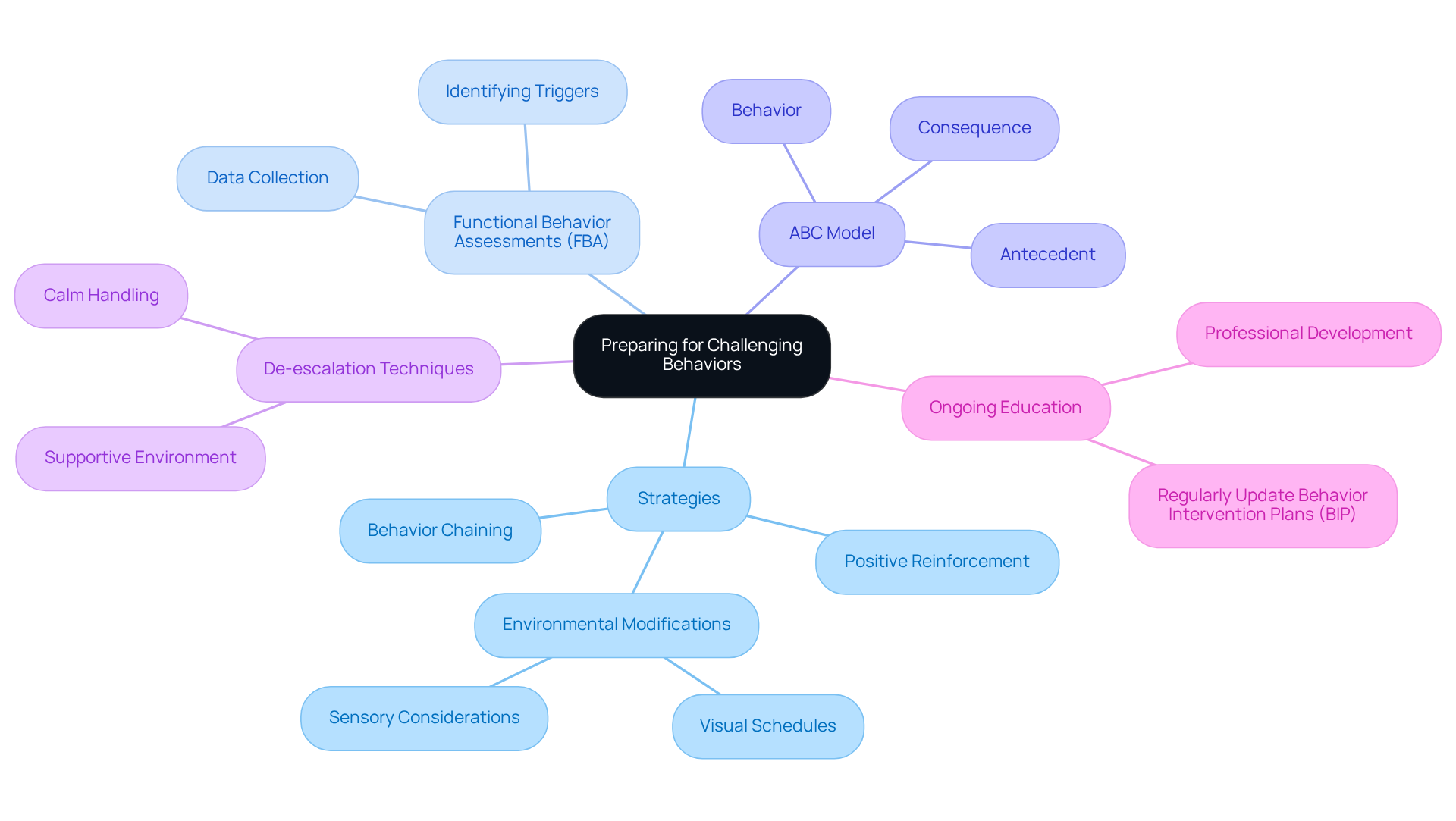
Collaboration among professionals in the ABA field is essential for enhancing behavior technician training results for practitioners. By working closely with Board Certified Analysts (BCBAs), educators, and other healthcare professionals, technicians can adopt a comprehensive approach to patient care. This interdisciplinary collaboration promotes the , which greatly improves service delivery and customer outcomes.
However, misconceptions about each other's roles can hinder mutual respect. Therefore, clarifying each professional's contributions to the team dynamic is crucial. Implementing structured communication protocols, such as:
can help mitigate communication gaps and improve collaboration among team members.
Furthermore, positive conduct support (PBS) is a vital concept in ABA that emphasizes collaborative efforts in promoting positive actions and enhancing participant outcomes. A collaborative atmosphere not only enhances the behavior technician training experience for support staff but also fosters professional growth, ensuring that they are well-prepared to address the varied requirements of those they assist. Effective collaboration leads to improved consistency in interventions and promotes a supportive atmosphere that benefits both practitioners and those they serve.
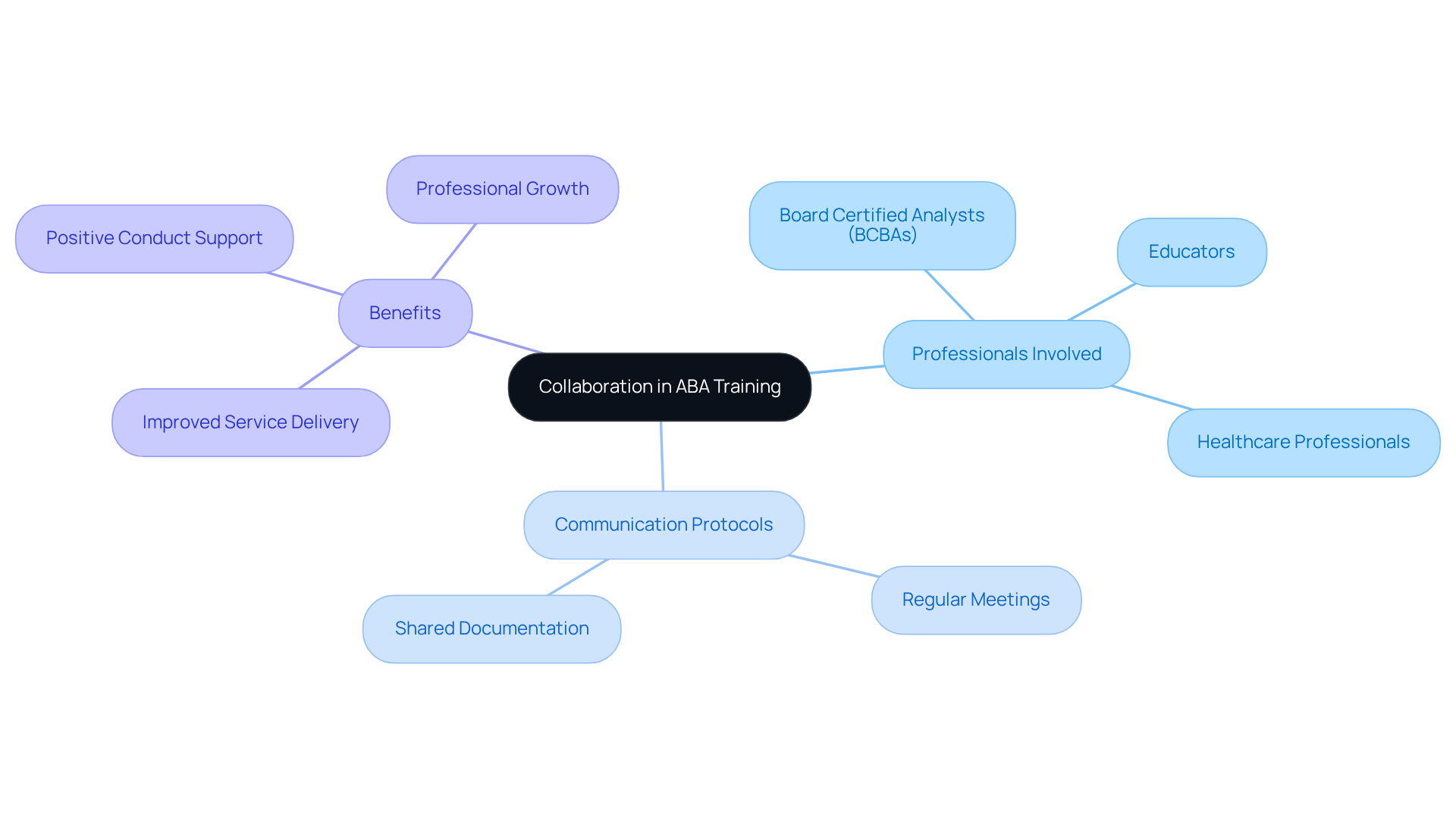
Effective communication abilities are essential for support specialists to excel in their roles. Technicians must and compassionately to customers and their families while collaborating effectively with colleagues. This encompasses:
By honing their communication skills, support professionals can forge strong connections with clients and families, fostering trust and enhancing the overall effectiveness of ABA therapy.
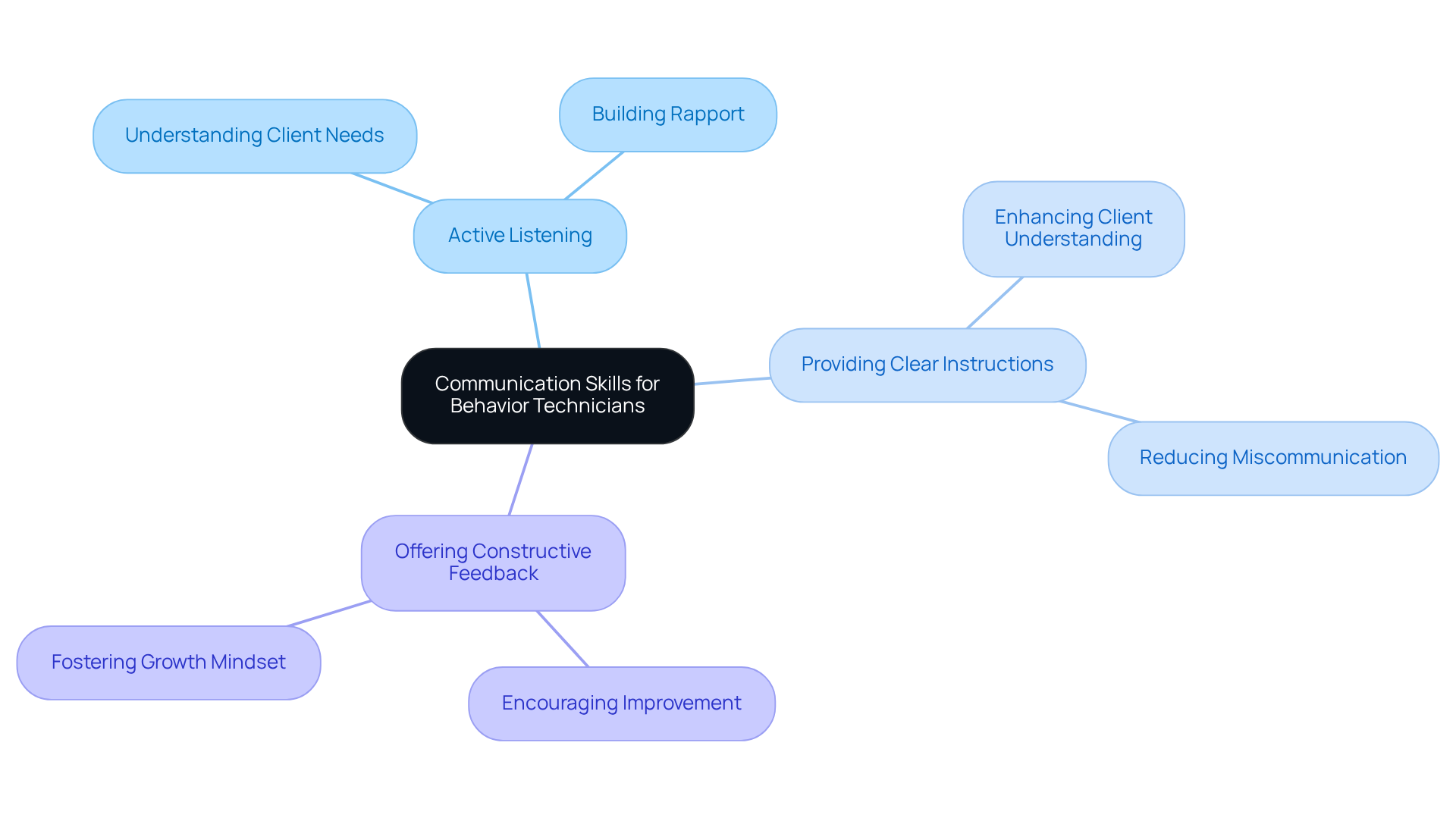
Feedback and evaluation serve as essential instruments for the ongoing enhancement of behavior professionals. Regular and constructive feedback empower professionals to identify their strengths and areas for improvement. Implementing systematic assessment methods facilitates the tracking of progress and allows for the adjustment of training strategies as necessary. By fostering a culture of feedback, behavior technician training can help technicians elevate their skills and guarantee the highest quality of care for their clients.
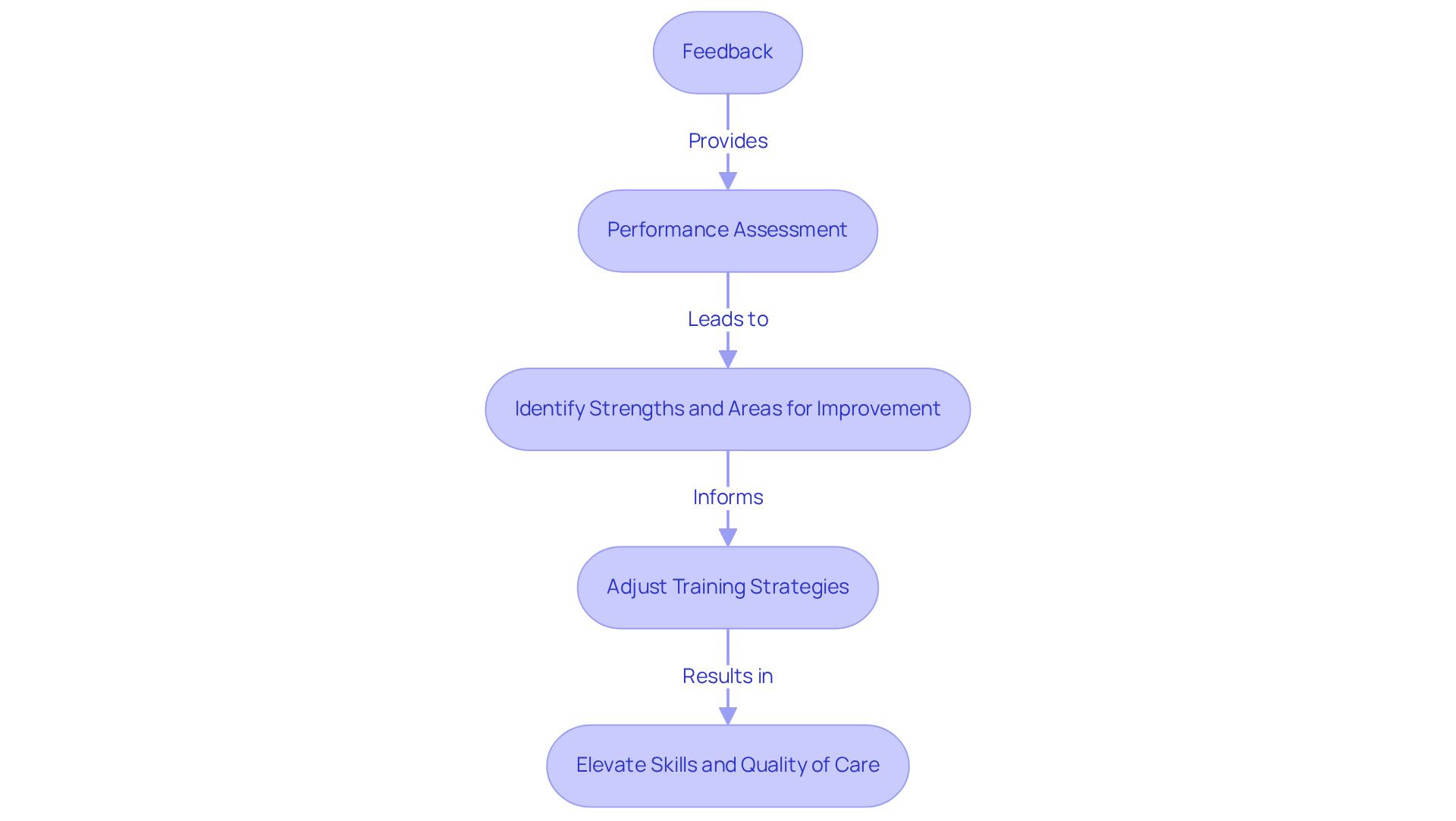
The effectiveness of behavior technician training is increasingly critical as the demand for skilled practitioners in Applied Behavior Analysis (ABA) continues to rise. This demand underscores the necessity for structured training programs, ongoing professional development, and a robust ethical foundation. By prioritizing these key elements, organizations can significantly enhance client outcomes and the overall efficacy of therapeutic practices.
Consider the importance of the 40-hour RBT course, mentorship, and supervision. These components are not merely beneficial; they are essential for preparing technicians to navigate real-world challenges. Practical experience gained through field training equips technicians with the skills needed to address the complexities of patient care. Furthermore, collaboration with other professionals fosters a comprehensive approach, ensuring that care is holistic and effective.
Effective communication and regular feedback are pivotal in enhancing the skills and confidence of practitioners. This, in turn, leads to better service delivery. As we reflect on the current landscape, one must ask: Are your hiring practices equipped to meet the growing needs of the ABA field? Investing in robust training programs and supportive environments is not just beneficial; it is vital for building a stronger, more effective workforce.
By embracing these critical elements, organizations can ensure they are not only addressing present needs but also paving the way for future advancements in behavior analysis practices. The time to act is now—prioritize comprehensive training and support for behavior technicians, and witness the transformative impact on your organization and the clients you serve.
What is Hire ABA and its purpose?
Hire ABA is a specialized recruitment platform designed to connect Board Certified Behavior Analysts (BCBAs) and support staff with job opportunities in the field of Applied Behavior Analysis (ABA). It streamlines the hiring process to help qualified professionals secure positions that align with their skills and career aspirations.
How does Hire ABA enhance the job-seeking experience?
Hire ABA provides personalized resume assessments and employs advanced job fit scoring to evaluate candidates' experiences and goals. This targeted approach improves the job-seeking experience for candidates and helps employers identify and recruit suitable candidates effectively.
What is the significance of the 40-hour RBT course?
The 40-hour Registered Behavior Technician (RBT) course is essential for aspiring professionals in ABA. It covers key topics such as analysis principles, ethical considerations, and data collection techniques, preparing candidates for the RBT certification exam and enhancing their ability to deliver effective ABA therapy.
What are the pass rates for the RBT certification exam?
Candidates who complete the 40-hour RBT course have significantly increased chances of passing the RBT exam, with first-time pass rates typically ranging from 70% to 80%, and a median pass rate of 80.4% for RBT programs. Blended learning modalities yield the highest pass rates, reaching up to 96.7%.
Why is continuous professional development important in ABA?
Continuous professional development is essential for practitioners to stay current with the latest research, methods, and ethical guidelines in ABA. Engaging in workshops, webinars, and conferences enhances skills and ensures the delivery of high-quality care to clients.
How can professionals engage in ongoing education in ABA?
Professionals can engage in ongoing education by actively seeking workshops and webinars that align with their developmental objectives, which allows them to refine their skills and develop effective, personalized treatment strategies tailored to individual needs.
Our expert recruitment strategies and AI-driven sourcing ensure that you receive top-notch candidates quickly, without compromising on quality. Whether you’re looking for BCBAs, Clinical Directors, or RBTs, we’ve got you covered.